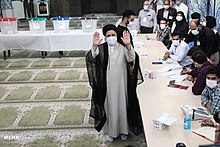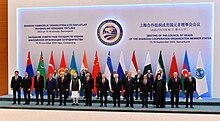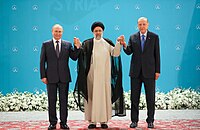Ebrahim Raisi
Judicial career
Early years
 | This article is part of a series about Ebrahim Raisi |

Main article: Ebrahim Raisi 2017 presidential campaign

In 2021, Raisi ran again for the presidency and won the election. The election had a 48.8% turnout, and 63% went to Raisi. Out of 28.9 million votes, around 3.7 million votes were not counted, likely because they were blank or otherwise invalid protest votes. According to many observers, the 2021 Iranian presidential election was rigged in favour of Raisi.
Almost 600 candidates, 40 of which were female, registered in the election, of which 7 men were approved a month before the election by the 12 jurists and theologians on the Guardian Council (an unelected body that has the final decision on candidate validity based on the strength of 'the candidates' qualifications'). Three of those seven candidates were subsequently pulled out before polling day. Before he withdrew, reformist candidate Mohsen Mehralizadeh hinted that the vote would be a foregone conclusion, saying during a candidate TV debate that the ruling clerics had aligned "sun, moon and the heavens to make one particular person the president," according to The Economist. Former president Mahmoud Ahmadinejad, among those barred from running, said in a video message that he would not vote, declaring: "I do not want to have a part in this sin."
Tenure
Raisi was appointed the president of Iran on 3 August 2021, through a decree issued by the Supreme Leader Ali Khamenei. During his inauguration speech, Raisi stated that his government would seek to lift the sanctions on Iran imposed by the United States, but added that it would not let foreigners dictate how its economy is run. He was sworn-in before the Islamic Consultative Assembly on 5 August during a ceremony attended by around 260 officials, both from Iran and other countries. In his speech, he stated that Iran was responsible for stabilising the Middle East, that he would resist foreign pressure on Iran but widen its external relations, especially with Iran's neighbours, promised to support any diplomatic move to lift the American sanctions and assured that Iran's nuclear programme was only meant for peaceful purposes. He also promised that he would try to improve the quality of life for Iranians and defend human rights.
Raisi appointed Muhammad Mukhbar, the head of the Execution of Imam Khomeini's Order foundation, as the first vice president of Iran on 8 August. Gholam-Hossein Esmaeili, a former spokesman for the judiciary, was also appointed Raisi's chief of staff. On 11 August, Raisi appointed former Minister of Petroleum and Minister of Commerce Masoud Mir Kazemi as a vice president and head of the Plan and Budget Organization. He also presented nominations for his cabinet before the Islamic Consultative Assembly on the same day.
Raisi's nomination of Ahmad Vahidi as Minister of Interior among his cabinet nominations was quickly strongly condemned by both Argentina and Israel, with the former having requested his arrest through a red notice of Interpol for his alleged involvement in the 1994 AMIA bombing in Buenos Aires. The Argentine foreign ministry stated that Vahidi's designation was an "affront to the Argentine justice and the victims of the terrorist attack".

On 20 August, Raisi appointed former Minister of Culture Mohammad Hosseini as vice president for parliamentary affairs.18 out of 19 of his cabinet picks were approved by the Islamic Consultative Assembly on 25 August, except Hossein Baghgoli, whom Raisi had chosen as the Minister of Education. Many of the ministerial choices are sanctioned by the United States and several are veterans of the Islamic Republic of Iran Armed Forces.
Raisi meanwhile appointed former IRGC commander-in-chief Mohsen Rezaee as the vice president for economic affairs on 25 August. He also appointed him as the secretary of the Supreme Council for Economic Coordination , as well as the secretary of the Iranian government's Economic Committee. On 26 August, Iran had a renewed diplomatic clash with Argentina, when the latter condemned the appointment of Rezaee. Rezaee is also wanted by Argentina for alleged involvement in the AMIA bombing. Argentina "energetically" condemned his designation and added that "Iran must cooperate with the investigation" and added again that Rezaee's designation was another "affront to the Argentine justice".
On 1 September, Raisi appointed former president of Al-Zahra University Ensieh Khazali as vice president for Women and Family Affairs and Mohammad Dehghan as vice president for legal affairs. On 4 September, he stated that Iran would resume talks over its nuclear programme, which have been stalled since his election victory, but not under pressure from Western countries.
On 5 September, Raisi appointed Meysam Latifi, former dean of Islamic education and management at Imam Sadiq University, as a vice president and head of the Administrative and Recruitment Affairs Organization. while Sowlat Mortazavi was appointed vice president for executive affairs and head of the presidential administration. In addition, former Head of Management and Planning Organization Farhad Rahbar was appointed the president's assistant for Economic Affairs. Amir-Hossein Ghazizadeh Hashemi was appointed a vice president and the head of the Foundation of Martyrs and Veterans Affairs on 12 September.
Importation of COVID-19 vaccine meanwhile surged since Raisi took office, with over 30 million doses being imported during the Iranian month of Shahrivar, more than the vaccine imports since February 2021, while 13.4 million were imported during the month of Mordad in which Raisi was sworn in. The Ministry of Foreign Affairs announced the importation of 60 million more vaccines on 19 September. In a pre-recorded speech before the 76th session of the United Nations General Assembly on 21 September, Raisi stated that Iran wanted to resume talks over its nuclear programme. He also stated that the hegemony of the United States was being rejected across the world and criticised its sanctions on Iran as unjust.
On 17 September, protests erupted after the death of Mahsa Amini, and unrest spread all over the country.[90] President Raisi promised to set up a commission to investigate the murder, but this did not affect the protests, as law-enforcement agencies are allegedly retreating from small cities due to uncontrollable rioting.
Foreign policy
After the fall of Kabul to the Taliban, Raisi stated on 16 August that the withdrawal of American forces from Afghanistan offered a chance for stabilising the country, which Iran would support. He also called on all parties to form an inclusive government. On 4 September, he urged that elections be held to elect a new Afghan government as soon as possible. On 18 September, he stated that Iran will not allow the establishment of any terrorist group, including the Islamic State, along its border with Afghanistan and use it for attacks on other nations. In addition, he called on the Taliban to form an inclusive government.In April 2022, Raisi warned that Israel would be targeted by his country's armed forces if it made "the slightest move" against Iran. During an interview in September of that year, he denounced the Abraham Accords and called Israel a "false regime". Raisi threatened major Israeli cities, including Tel Aviv and Haifa, and stated that the only solution to the Israeli-Palestinian conflict is the establishment of a Palestinian state "from the river to the sea".Raisi said that his government's priority in the meeting with Syrian President Bashar al-Assad was to strengthen strategic ties between Iran and Syria.He criticized the Saudi-led blockade of Yemen and called for a ceasefire.In March 2022, according to Foreign Policy, Raisi pledged an alliance in favor of Russia when the Russian invasion of Ukraine started.Negotiations with the U.S. over the Joint Comprehensive Plan of Action (JCPOA) have continued to be stalled under Raisi. with him accusing the Americans of "delaying and dragging their feet".Between 14–17 February 2023, Raisi visited China and met Chinese leader Xi Jinping. During the meeting, the two countries signed 20 cooperation agreements and agreed to boost relations. Following the talks, Saudi Arabia and Iran agreed to restore diplomatic ties cut in 2016 on 10 March after a deal brokered between the two countries by China following secret talks in Beijing.Raisi praised Hamas' 7 October attacks on Israel, stating that these actions would lead to the demise of Israel. He condemned Israel's actions in the Gaza Strip during the Israel–Hamas war and accused Israel of committing genocide against Palestinians in Gaza "with the support of the United States and certain European countries." In January 2024, he predicted that the Israel-Hamas war would result in "Israel's destruction."Raisi canceled a trip to Geneva in December 2023 due to accusations against him regarding his role in the torture and murder of prisoners in 1988, for which he could face arrest.
- Raisi was widely considered to be a hardliner in Iranian politics. He strongly supported sex segregation. He said in a 2014 interview about planned segregation in Tehran Municipality "I think this is a good move because the majority of women do a better job in a totally relaxed atmosphere and fit are required." He was a supporter of Islamization of universities, revision of the Internet and censorship of Western culture. Raisi claimed that economic sanctions were an opportunity. Raisi said: "We will have guidance patrols, but for managers." He also said: "If the government does well, the people will do well." He stated that the amputation of thieves' hands, which is based on a very strict interpretation of Sharia, is one of "our honours" and that such punishments will not be limited to now and will be continued in the future. He stated that he should be honoured and esteemed for his role in the 1988 Iranian mass executions of political prisoners.Raisi was one of nine Iranian officials listed in November 2019 subjected to sanctions by the United States Department of State due to alleged human rights abuses. He was sanctioned by the U.S. Office of Foreign Assets Control in accordance with Executive Order 13876. He was accused of crimes against humanity by international human rights organizations and United Nations special rapporteurs. A formal request had been made to arrest Raisi for crimes against humanity, if he attended the 2021 United Nations Climate Change Conference in Scotland.
Economy

Raisi with Indian Prime Minister Narendra Modi during the 15th BRICS summit in Johannesburg, South Africa, 24 August 2023 In 2017, Raisi reported, "I see the activation of a resistance economy as the only way to end poverty and deprivation in the country."He supports development of the agricultural sector over commercial retail, which "will eventually benefit foreign brands."
In 2017, he promised to triple the monthly state benefits, currently Rls.450,000 per citizen, to tackle corruption and create six million jobs. He said (about sanctions against Iran): "Sanctions should be seen as an opportunity for economic empowerment, and we should strengthen ourselves instead of falling short."
Raisi said in regards to the issue of lifting sanctions: "every government that takes office (to be elected), should lift the oppressive sanctions, and it must be pursued seriously; and the neutralization of sanctions should be on the agenda and we should not condition the economy; Neither the corona nor the flood nor the sanctions should have an impact."
Women's rights
See also: Women's rights and Women's rights movement in Iran
In state-led media, Raisi said that "no one has the right to violate the freedom and rights of girls and women" and "it is incomplete to talk about culture and economy without the role of women". He emphasized that "women's rights are God-given, and the government should not only not lose this right, but it should also create the conditions for it to flourish" and "in many spaces, women's role-playing is empty and women's talent, creativity, initiative and innovation can be used a lot". Despite these comments, Raisi signed orders creating stricter hijab restrictions for women in Iran.
Intellectuals and artists
Raisi stated: "The intellectual of the society understands before the others and watches the threats of the society, and soon warns the society with his poetry and art and saves the society from falling asleep, like a muezzin." According to him, supporting the people of culture and art should not be verbal and should lead to action. He said: "Teachers are the true intellectuals of society and must observe and warn of harm; teachers are the identifiers and civilizers of society."
Homosexuality
See also: LGBT rights in Iran
Raisi has made discriminatory remarks about homosexuality, calling same-sex relations "savagery". The Center for Human Rights in Iran asserts that this type of rhetoric exacerbates prejudice and violence against LGBTQ+ individuals in the country. When visiting Uganda, after the country had recently passed a law instituting the death penalty for homosexuality, Raisi stated: "I believe that this issue, and these strong attacks by the West against the establishment of families and against the culture of the nations, is another area of cooperation for Iran and Uganda," further adding: "The Western countries try to identify homosexuality as an index of civilization, while this is one of the dirtiest things which have been done in human history."











0 Comments